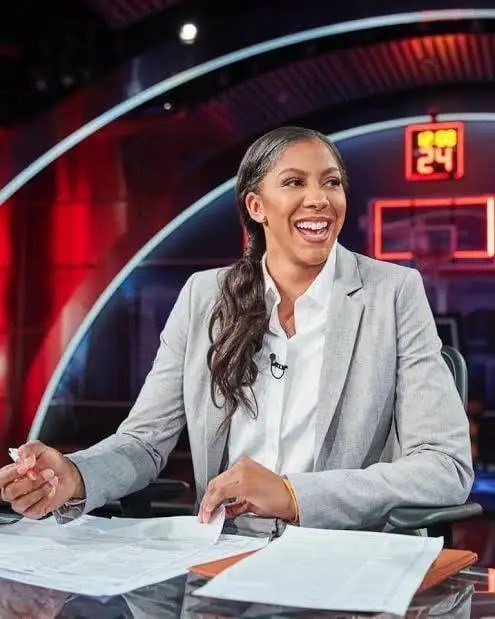
In a historic and long-anticipated decision, ESPN has officially named Candace Parker as the Greatest of All Time (GOAT) in college women’s basketball, solidifying her legacy as one of the most dominant forces the sport has ever seen. The former Tennessee Lady Vols superstar beat out a lineup of legends, including Diana Taurasi (UConn), Cheryl Miller (USC), and Lynette Woodard (Kansas), in a GOAT debate that stirred passionate responses from fans, coaches, and former players across generations.
The announcement came during ESPN’s special segment on the greatest women’s college basketball players of all time, where a panel of analysts, former coaches, and players weighed in on the achievements, impact, and legacy of the nominees. After weeks of online fan voting, statistical analysis, and expert discussion, Parker emerged as the top choice.
A Legacy Built on Greatness
Candace Parker’s college career at the University of Tennessee under the legendary coach Pat Summitt was nothing short of extraordinary. She played for the Lady Vols from 2005 to 2008, leading the team to back-to-back NCAA Championships in 2007 and 2008. Parker was a two-time Naismith College Player of the Year, a two-time Final Four Most Outstanding Player, and won the Wooden Award twice.
What made Parker’s career so remarkable wasn’t just the accolades—it was how she played the game. Standing 6’4″, Parker redefined the forward position with her unmatched versatility, athleticism, and basketball IQ. She was the first woman to dunk in an NCAA tournament game and only the second to do so in college basketball history. Her combination of finesse and power, court vision, and leadership turned her into an icon not only for the Lady Vols but for women’s basketball at large.
Beating the Greats
To earn the GOAT title, Parker had to surpass some of the most iconic names in the sport:
Diana Taurasi of UConn, a three-time NCAA champion under Geno Auriemma, known for her clutch performances and leadership.
Cheryl Miller, whose dominance at USC in the 1980s changed the perception of women’s basketball and led to two national titles.
Lynette Woodard, a trailblazer at Kansas and the all-time leading scorer in women’s college basketball history, who later became the first female Harlem Globetrotter.
While each nominee had a strong case, Parker’s blend of individual excellence, team success, and cultural impact proved decisive.
“Candace wasn’t just a great player—she was a transformational figure,” said ESPN analyst Rebecca Lobo, herself a former UConn star. “She inspired a whole new generation of girls to believe they could do it all on the court. Her impact goes beyond stats.”
Praise from the Basketball World
The announcement sparked an outpouring of support and celebration on social media from athletes, coaches, and fans alike.
“@Candace_Parker is the real deal,” tweeted NBA legend Magic Johnson. “She changed the game and deserves this honor. Congratulations, GOAT!”
Taurasi, one of the finalists, also offered her congratulations: “Well deserved. Candace set the standard and raised the bar for everyone who came after her.”
Coach Pat Summitt, who passed away in 2016, was often credited with bringing out the best in Parker. In archived footage shared during the ESPN segment, Summitt once said, “Candace has the heart of a champion, the mind of a leader, and the soul of a competitor. She’s special.”
Looking Ahead
Candace Parker’s influence stretches far beyond her college days. She has enjoyed a stellar WNBA career, winning multiple championships and MVP awards, and has become a respected broadcaster and advocate for women’s sports. Her presence in the game remains strong as a role model and voice for equity, representation, and excellence.
“I’m honored, humbled, and honestly just grateful,” Parker said in a reaction video posted by ESPN. “To be mentioned among those women is already surreal. But to be named the GOAT? That’s something I’ll carry with pride—and with the hope that young girls out there know they can achieve greatness too.”
In crowning Candace Parker as the GOAT of college women’s basketball, ESPN has not only recognized her immense contributions on the court but also her lasting impact off of it. She didn’t just play the game—she changed it.







